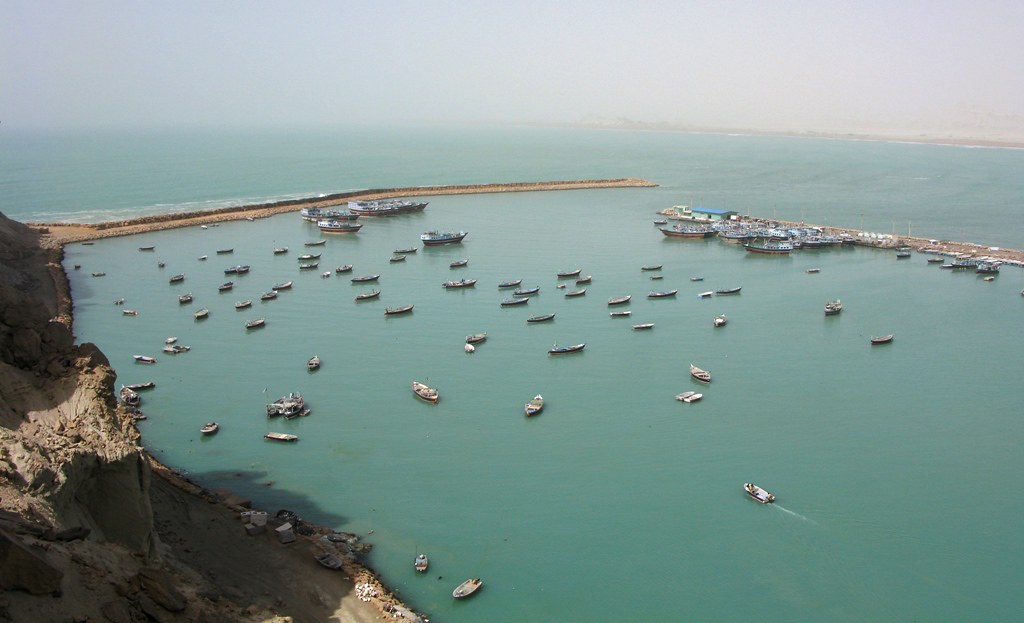US Sanctions impacts Chabahar funding
July 9, 2019 | Expert Insights

Background
The port of Chabahar is located on the Makran coast of Sistan and Baluchistan Province, next to the Gulf of Oman, at the mouth of Strait of Hormuz. Being close to Afghanistan and the Central Asian countries of Turkmenistan and Uzbekistan, it has been termed the "Golden Gate" to these land-locked countries.
Afghanistan is connected to the Chabahar through its land border with Iran, and India via the sea. The port is accessible for all the three countries and serves to facilitate trade among them. It is considered to be a significant opportunity for India and Afghanistan to bypass Pakistan’s Gwadar seaport and its trade routes. The strategic importance of Chabahar for India grew further after Pakistan handed over control of its Gwadar Port to China.
The Chabahar route was slated to reduce 60 per cent shipment costs and 50 per cent shipment time from India to Central Asia. The first phase of Chabahar port was inaugurated in December 2017. India committed to invest $500 million, according to the first phase agreement. Trade through the port began in February 2019. Since then Afghanistan has exported goods worth more than $150 million to India through the air corridor and goods worth $2 million through Chabahar.
Analysis
The Indian government has significantly reduced the budgetary allocation for the development of Chabahar Port in 2019-20 following tensions between Washington and Tehran. Allocation of funds for Chabahar Port, which New Delhi is developing, was reduced to Rs. 45 crore in the financial year 2019-20 from Rs. 150 crore in the last fiscal. Finance Minister Nirmala Sitharaman has diverted a substantial amount of funds mainly towards enhancing India’s aid to Nepal, Maldives and Mauritius.
In 2016, PM Modi and his counterpart Ashraf Afghani signed a trilateral agreement to develop Chabahar in Tehran. New Delhi also has plans to build a 500-km rail link from the Chabahar Port to Zahedan, the provincial capital of Sistan-Baluchestan, at the cost of $1.6 billion. After the connection with Zahedan, the next phase of the project will link Zaranj in Afghanistan, boosting trade between India, Iran and Afghanistan.
The Trump administration has exempted the Chabahar port from US sanctions as a goodwill gesture toward India, which sees the outpost as a means of facilitating trade with Afghanistan. When US Secretary of State Mike Pompeo visited India in July 2019, he advised New Delhi not to slacken its pace in developing the Chabahar Port.
In 2019, India Ports Global Ltd has scrapped a tender to select an Indian strategic partner to manage, operate and maintain (MOM) the container and multi-purpose terminals at the Chabahar port in Iran. “The participation of bidders gets reduced with the sword of sanctions hanging. So, we have deferred it for the time being. We have terminated the current tender and will come out with a fresh tender once we get more clarity on the issue,” a Shipping Ministry official said, adding that India Ports Global has hired a local Iranian firm – Kaveh Port and Marine Services Co — to run the port as an interim arrangement.
Assessment
Our assessment is that the Chabahar port is India’s answer to Pakistan’s Gwadar. It is an essential pillar of Indian foreign policy aimed at accessing markets in Central Asia and Eurasia. The port was meant to connect India to Central Asian countries that are also major energy producers in the region.
While Washington has given a waiver to develop Chabahar, there is nothing provided in writing. We feel that it is more likely that Afghan banks are hesitant to open credit lines for shipments. Shipments and cargo handlers are also likely staying away from servicing the Iranian port. Furthermore, European and Chinese suppliers who had won the bid to supply equipment for the port are now reluctant to deliver, fearing the adverse impact on their business with the US.
We believe that after Tehran proposed to connect Chabahar port to Gwadar port (endpoint of China Pakistan Economic Corridor), India is concerned over the possibility of the port being linked to Belt and Road Initiative (BRI) of China. We believe that if Iran feels India is not doing enough in terms of assistance bilaterally and multilaterally, it will gladly turn to China to develop Chabahar.








Comments